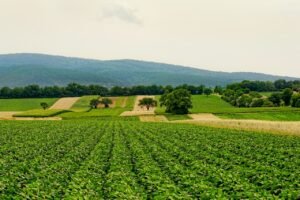
Urban farming systems are becoming increasingly popular among city dwellers around the world. These innovative systems allow individuals to grow their own produce in urban environments, making fresh and healthy food more accessible to city residents. Not only do urban farming systems provide a sustainable solution to food production, but they also offer numerous benefits such as improved mental and physical well-being, reduced carbon footprint, and the creation of vibrant and cohesive communities. In this article, we will explore the various advantages of urban farming systems and how they are transforming the way we think about food in urban areas.

Increased Access to Fresh and Healthy Food
Reduced Food Deserts in Urban Areas
Urban farming systems play a crucial role in reducing food deserts, which are areas with limited access to affordable and nutritious food. By bringing agriculture into the cities, these systems provide fresh produce to communities that would otherwise rely solely on processed and unhealthy options. By growing fruits, vegetables, and herbs locally, urban farming enables residents to have easy access to a variety of nutritious food options, ensuring that they can make healthier choices for themselves and their families.
Promotion of Healthy Eating Habits
By increasing access to fresh and healthy food, urban farming systems also promote healthy eating habits within urban communities. When people have convenient access to locally grown produce, they are more likely to incorporate these nutritious options into their everyday meals. This translates to a greater intake of vitamins, minerals, and fiber, which can improve overall health and reduce the risk of chronic diseases such as obesity, diabetes, and heart disease. Urban farming systems empower individuals to take control of their diets and make informed choices for a healthier lifestyle.
Improved Food Security
Urban farming systems contribute significantly to improving food security in urban areas. Food security refers to the consistent availability and access to enough affordable and nutritious food. By growing food locally, urban farming systems help to diversify the food supply chain, reducing dependence on external sources. In times of natural disasters or disruptions to transportation, these systems provide a reliable and resilient source of food. Additionally, urban farming creates opportunities for individuals and communities to become more self-sufficient, reducing their vulnerability to food shortages and price fluctuations.
Environmental Sustainability
Reduced Carbon Footprint
One of the most significant benefits of urban farming systems is their ability to reduce carbon footprints. Traditional agriculture relies heavily on long-distance transportation and refrigeration, which contribute to greenhouse gas emissions. By growing food in urban areas, the need for long transport distances is eliminated, resulting in a considerable reduction in carbon emissions related to food production. Additionally, urban farming systems can adopt sustainable practices such as organic farming techniques, which further minimize environmental impact and promote a more sustainable approach to agriculture.
Conservation of Natural Resources
Urban farming systems contribute to the conservation of natural resources by utilizing available urban space more efficiently. Instead of sprawling agricultural land, these systems make use of rooftops, vertical gardens, and even abandoned lots for cultivation, maximizing the use of existing infrastructure. By making efficient use of space, urban farming minimizes the need for land conversion, preserving natural habitats and protecting biodiversity. Furthermore, these systems can implement water-saving techniques such as drip irrigation and rainwater harvesting, reducing water consumption and conservation.
Water Management
Urban farming systems prioritize water management through efficient irrigation practices. With increasing water scarcity and demand in urban areas, it is essential to find sustainable ways to use water in agriculture. Urban farming can utilize drip irrigation systems, which deliver water directly to the roots of plants, reducing water loss through evaporation and runoff. Additionally, these systems can explore innovative techniques such as hydroponics or aquaponics, which use significantly less water compared to traditional farming methods. By implementing water management strategies, urban farming contributes to water conservation and ensures the long-term sustainability of water resources.

Enhanced Community Engagement
Promotion of Social Interaction
Urban farming systems are not just about food production; they also promote social interaction and community engagement. These systems provide a shared space for residents to come together, work on common goals, and cultivate a sense of belonging. Gardening activities, workshops, and community events related to urban farming foster social connections among community members, creating a supportive and vibrant environment. By bringing people together around a common interest in sustainable food production, urban farming strengthens community bonds and enhances the overall well-being of residents.
Creation of Green Spaces
Urban farming systems contribute to the creation of green spaces within cities. In densely populated urban areas, green spaces are often limited, and the presence of plants and trees is minimal. Urban farming introduces pockets of greenery, transforming vacant lots, rooftops, and even walls into thriving gardens. These green spaces not only beautify the urban landscape but also provide numerous benefits such as improved air quality, reduced noise pollution, and mitigation of the urban heat island effect. By bringing nature back into the city, urban farming enhances the aesthetic appeal and livability of urban environments.
Education and Skill Development
Urban farming systems offer unique opportunities for education and skill development within communities. These systems can serve as outdoor classrooms, where individuals of all ages can learn about sustainable agriculture, food production, and environmental stewardship. By participating in urban farming activities, community members can develop practical skills such as gardening, composting, and irrigation techniques. This hands-on learning experience empowers individuals to become active participants in the food system and equips them with valuable knowledge that they can apply in their own lives. Through education and skill development, urban farming systems empower communities and promote a culture of sustainability.
Economic Benefits
Job Creation
Urban farming systems create employment opportunities within communities, contributing to local economic development. From small-scale urban farms to larger agricultural enterprises, these systems require a range of skills and expertise, leading to job creation in various sectors such as farming, food processing, distribution, and marketing. By providing employment opportunities, urban farming not only strengthens the local economy but also reduces unemployment rates and enhances the overall quality of life for residents. Additionally, these systems can support entrepreneurship, enabling individuals to start their own urban farming businesses and contribute to the local economy.
Support for Local Businesses
Urban farming systems support local businesses by providing a local and reliable source of fresh produce. In many urban areas, a significant portion of the food supply comes from distant locations, often large agribusinesses. By supporting local urban farms, residents can access fresh and locally grown food, supporting a more sustainable and resilient food system. Local restaurants, food cooperatives, and farmers’ markets can also benefit from these systems by sourcing their products directly from urban farms, strengthening local food networks and promoting economic self-sufficiency within the community.
Reduced Food Costs
Urban farming systems have the potential to reduce food costs for both producers and consumers. For producers, the shorter supply chain and elimination of long-distance transportation and storage costs can result in higher profitability. These savings can be passed on to consumers, making fresh and healthy food more affordable and accessible to a wider range of individuals. By reducing food costs, urban farming helps to address issues of food affordability and food insecurity within urban areas, ensuring that everyone has the opportunity to access nutritious food that is essential for a healthy and balanced diet.

Mitigating Urban Heat Island Effect
Cooling Urban Environments
Urban farming systems contribute to mitigating the urban heat island effect by cooling urban environments. The heat island effect occurs when cities absorb and trap heat, resulting in higher temperatures compared to rural areas. Through shade creation, transpiration, and evapotranspiration, urban farming systems can lower ambient temperatures and create a more comfortable living environment. Vegetation helps to block and absorb solar radiation, reducing the amount of heat absorbed by buildings and surfaces. By incorporating green spaces and urban farms into the urban fabric, cities can combat the heat island effect and improve the overall climate and livability for residents.
Reducing Energy Consumption
Urban farming systems also contribute to reducing energy consumption in urban areas. Traditional agriculture relies heavily on fossil fuels for machinery, transportation, and irrigation. By bringing food production closer to consumers, urban farming reduces the need for long-distance transportation and refrigeration, resulting in lower energy use. Additionally, urban farming can explore renewable energy options such as solar panels or wind turbines to power irrigation systems and other farming operations. By adopting energy-efficient practices, urban farming systems demonstrate a sustainable approach to food production and contribute to overall energy conservation efforts.
Improving Air Quality
Urban farming systems play a vital role in improving air quality in urban areas. The presence of vegetation helps to trap and filter pollutants, reducing their concentration in the air. Plants remove carbon dioxide and release oxygen through the process of photosynthesis, enhancing the overall air quality. By incorporating green spaces and urban farms into urban landscapes, cities can combat air pollution, particularly in densely populated areas characterized by traffic congestion and industrial activities. Improving air quality has a direct impact on public health, reducing the incidence of respiratory diseases and enhancing the overall well-being of urban residents.
Addressing Climate Change
Carbon Sequestration
Urban farming systems contribute to climate change mitigation through carbon sequestration. Plants absorb carbon dioxide from the atmosphere during photosynthesis, converting it into oxygen and organic matter. This natural process helps to reduce the concentration of greenhouse gases in the air, playing a crucial role in climate change mitigation. By incorporating urban farms into cities, more carbon dioxide can be sequestered, offsetting carbon emissions and reducing the overall carbon footprint. Urban farming systems, therefore, provide an opportunity to tackle climate change at a local level and contribute to global efforts to reduce greenhouse gas emissions.
Reduced Food Transportation Emissions
Food transportation is a significant contributor to greenhouse gas emissions. By growing food locally through urban farming systems, the need for long-distance transportation is minimized, resulting in a considerable reduction in emissions. Traditional agricultural practices involve transporting food from rural areas to urban markets, often over long distances. By bringing food production closer to consumers, urban farming eliminates or reduces the reliance on transportation networks, leading to lower carbon emissions and a more sustainable approach to food production. Reduced food transportation emissions contribute to overall efforts to mitigate climate change and create a more environmentally friendly food system.
Adaptation to Changing Climate
Urban farming systems facilitate the adaptation to changing climate conditions. Climate change impacts such as extreme weather events, droughts, and heatwaves pose significant challenges to traditional agriculture. However, urban farms provide the opportunity to implement innovative practices that can withstand and adapt to these changes. Techniques such as vertical farming, hydroponics, and aquaponics allow for controlled environments and efficient use of resources, making urban farming more resilient to climate variability. By adapting to the changing climate, urban farming systems ensure a continuous and reliable food supply, even in the face of increasingly unpredictable environmental conditions.
Improving Mental Health and Well-being
Stress Reduction and Relaxation
Urban farming systems have a positive impact on mental health and well-being by providing stress reduction and relaxation opportunities. Spending time in natural environments has been shown to reduce stress levels and improve mental health. Engaging in gardening activities, tending to plants, and being surrounded by greenery can have a calming effect, alleviating symptoms of anxiety and depression. Urban farming systems provide urban residents with a much-needed escape from the hustle and bustle of city life, creating tranquil spaces for relaxation and reflection. By offering moments of respite and connection with nature, these systems contribute to the overall mental well-being of individuals.
Enhanced Connection with Nature
Urban farming systems enhance the connection between urban dwellers and the natural world. In urban areas, access to nature is often limited, and exposure to green spaces is minimal. Urban farming reintroduces the natural world into the urban environment, providing opportunities for individuals to interact with plants, animals, and ecosystems. By engaging with the natural world, people can develop a deeper appreciation and understanding of the environment, fostering a sense of eco-consciousness and environmental stewardship. The connection with nature that urban farming systems provide helps to nurture a holistic and balanced relationship between humans and their surrounding ecosystems.
Therapeutic and Recreational Opportunities
Urban farming systems offer therapeutic and recreational opportunities for individuals of all ages. Gardening and tending to plants have been found to have therapeutic effects, reducing symptoms of stress, anxiety, and even physical pain. These systems provide a space for individuals to engage in enjoyable and meaningful activities, fostering a sense of purpose and accomplishment. Whether it is planting seeds, harvesting vegetables, or simply spending time in a green space, urban farming offers recreational opportunities that promote physical, mental, and emotional well-being. By providing therapeutic and recreational outlets, these systems contribute to the overall quality of life for urban residents.
Supporting Biodiversity and Wildlife Habitats
Creation of Urban Biodiversity Corridors
Urban farming systems play a vital role in supporting biodiversity within urban areas. By incorporating green spaces, such as urban farms, into the urban landscape, cities can create corridors that connect fragmented natural habitats. These corridors serve as pathways for wildlife to move throughout the urban environment, increasing biodiversity and promoting ecological balance. The presence of diverse plant species within urban farms also attracts a range of pollinators, birds, and beneficial insects, enhancing overall biodiversity and contributing to the health of urban ecosystems. By supporting biodiversity, urban farming systems create resilient and thriving urban environments.
Providing Habitat for Urban Wildlife
Urban farming systems provide essential habitat for urban wildlife, especially in areas where natural habitats have been displaced or degraded. By creating green spaces and integrating native plant species, these systems provide food, shelter, and nesting opportunities for a variety of bird species, insects, and small mammals. The presence of wildlife within urban areas adds to the ecological diversity and creates a sense of connection with the natural world. Urban farming systems prioritize the inclusion of wildlife-friendly features such as birdhouses, bat boxes, and pollinator gardens, promoting coexistence between humans and wildlife within the urban environment.
Promotion of Pollinator Conservation
Urban farming systems contribute to the conservation of pollinators, which are crucial for the reproduction of many plant species. Bees, butterflies, and other pollinators play a vital role in pollinating flowers and ensuring seed production. However, their populations have been declining due to habitat loss, pesticide use, and other factors. Urban farms provide a safe haven for pollinators by creating diverse and pesticide-free environments with a variety of blooming flowers. By promoting pollinator-friendly practices, such as planting native flowering plants and avoiding the use of harmful chemicals, urban farming systems support pollinator conservation efforts and contribute to the overall health of urban ecosystems.
Reducing Food Waste
Shorter Farm-to-Table Supply Chain
Urban farming systems help to reduce food waste by shortening the farm-to-table supply chain. Traditional agricultural practices involve long-distance transportation and storage, which can result in food spoilage and waste. By growing food within urban areas, the time between harvest and consumption is significantly reduced, minimizing the opportunities for spoilage to occur. Additionally, urban farming systems can implement efficient harvesting and distribution practices to ensure that fresh produce reaches consumers at its peak ripeness and quality. Through a shorter supply chain, urban farming reduces food waste and increases the overall efficiency of the food system.
Education on Sustainable Food Consumption
Urban farming systems contribute to the reduction of food waste by educating communities on sustainable food consumption practices. These systems can provide educational programs and workshops on topics such as meal planning, proper storage, and utilization of leftovers. By empowering individuals with knowledge on reducing food waste, urban farming promotes responsible and mindful consumption habits. Residents can learn about the importance of utilizing all parts of the plant, composting organic waste, and minimizing food waste at home. By fostering a culture of sustainability and waste reduction, urban farming systems play a crucial role in addressing the global issue of food waste.
Composting and Recycling Programs
Urban farming systems can implement composting and recycling programs to further reduce food waste. Composting organic waste from urban farms and surrounding communities creates nutrient-rich soil amendments that can be used to nourish plants and improve soil fertility. By diverting organic waste from landfills, these systems reduce greenhouse gas emissions associated with waste decomposition. Additionally, urban farming systems can collaborate with local recycling programs to ensure that non-organic waste, such as packaging materials, is properly recycled. Through composting and recycling initiatives, urban farming systems close the loop on waste, creating a more sustainable and circular approach to food production and consumption.
Adapting to Population Growth and Urbanization
Optimizing Land Use
As urban populations continue to grow, it becomes increasingly important to optimize land use within cities. Urban farming systems offer a solution by utilizing underutilized spaces and converting them into productive agricultural land. Rooftop gardens, vertical farms, and community gardens make efficient use of available urban space, unlocking the potential for local food production. By transforming vacant lots, rooftops, and even walls into productive agricultural spaces, urban farming maximizes land use efficiency and ensures that urban areas can meet the food demands of a growing population. Optimizing land use through urban farming supports sustainable urban development and reduces the pressure on rural areas for agricultural expansion.
Increasing Local Food Production
With growing urban populations, the demand for food increases significantly. Urban farming systems help to meet this demand by increasing local food production. By bringing agriculture into cities, these systems reduce the reliance on food imports and long-distance transportation, ensuring a more resilient and self-sufficient food system. Urban farms can produce a wide variety of fresh and nutritious fruits, vegetables, and herbs that cater to the diverse dietary needs and preferences of urban residents. Increasing local food production through urban farming enables cities to feed themselves and reduces dependence on external sources, creating a more sustainable and robust food supply.
Resilient Food Systems
Urban farming systems contribute to the development of resilient food systems that can adapt to population growth and urbanization. As cities expand, traditional agricultural practices become increasingly challenged by limited land availability and the environmental impacts of intensive farming. Urban farming offers an alternative approach that provides a range of benefits, such as reduced food transportation, increased access to fresh produce, and improved community engagement. By integrating urban farms into urban planning and food system strategies, cities can develop resilient and sustainable food systems that can withstand the challenges of population growth and urban development. Urban farming contributes to a future where cities can nourish their residents and thrive in harmony with the environment.
In conclusion, urban farming systems offer a multitude of benefits that positively impact various aspects of urban life. From increased access to fresh and healthy food to mitigating the effects of climate change and supporting biodiversity, these systems play a crucial role in creating sustainable and livable cities. By promoting healthy eating habits, enhancing community engagement, and providing economic opportunities, urban farming systems contribute to the overall well-being and resilience of urban communities. As cities continue to face challenges such as population growth, food insecurity, and environmental degradation, urban farming emerges as a practical and innovative solution that brings people closer to nature while ensuring the availability of nutritious food for all.







